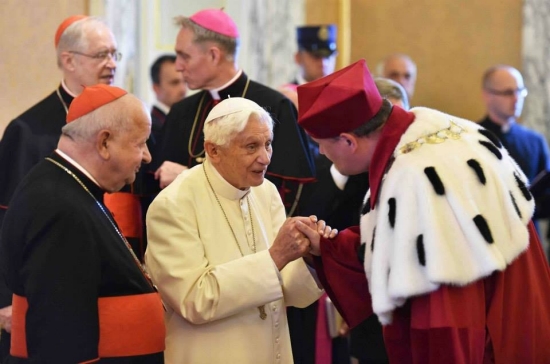Benedict XVI receives Doctorates honoris causa: “Music takes its origin from the meeting with God”

Luca Caruso
(6/7/15) “In no other cultural field there is such a great music as the one originated in the sphere of the Christian faith: from Palestrina to Bach and Händel, up to Mozart, Beethoven and Bruckner. The Western music is something unique which has no equal in the other cultures”. It’s the core of the speech Pope-emeritus Benedict XVI pronounced, during the ceremony for the awarding of the honorary Doctorates from the Pontifical University John Paul II of Kracow and the Kracow Music Academy, held on the last 4th July at the Apostolic Palace in Castel Gandolfo.
“This way – Benedict XVI explained - my relationship with Poland, with Kracow, with Our Great Saint John Paul II native land has become even much stronger. Because without him my spiritual and theological path isn’t even conceivable”.
To an answer from the back the Pope wanted to answer in his speech: “What is really music? Where does it come from? And what does it aim to?” And he stated “three places”. First of all “the experience of love”. “When men were caught by love, another dimension of the existence opened them up, a
new greatness and largeness of reality. And it encouraged to express oneself in a new way”. Then “the experience of sadness, being touched by death, by suffering and by the abyss of existence”. Finally, “the meeting with the Divine, that since the beginning is part of what defines the human. Even more so it’s here where the totally different and the totally great generate new ways of expressing oneself”. “It can be said – Benedict XVI summed up – that the quality of music depends on the pureness and greatness of the meeting with God, with the experience of love and of suffering. The purer and the truer that experience is, the purer and greater the music arising and developing from it will be”.
Benedict XVI also mentioned the “tension” between the “participation actuosa complying with the liturgy” and the “solemn music enclosing the sacred act”. How to conciliate the two things, fully carrying out the Council?
“The Western music – he pointed out– greatly overcomes the religious and church sphere. And yet it finds its deepest origin in the liturgy in the meeting with God. (….) The great sacred music is a reality of theological kind and of permanent meaning for the faith of the whole Christianity, even though it isn’t necessary to be always and everywhere carried out at all. Otherwise it is however clear that it can’t disappear from liturgy and its presence can be a totally special way to participate to sacred celebration, to the mystery of faith”.
“If we think of the liturgy celebrated by Saint John Paul II in every continent – Ratzinger has still reminded – we can see all the amplitude of the expressive possibilities of faith in the liturgical event, and we can also see how the great music of the Western tradition isn’t unknown to liturgy, but it originated and developed from it and this way it can always contribute to give it form again.
The activity of the two Universities giving me this honorary Doctorate – the Pope-emeritus then concluded – represents an essential contribution so that the great gift of music coming from the tradition of Christian faith remains alive and could be helpful for the creative force of faith not to die also in the future”.
“We consider the unusual acceptance of this distinction –
the cardinal Stanisław Dziwisz, Kracow Archbishop, Lord Chancellor of the Pontifical University stated in his greetings – as an evidence of the esteem that Your Holiness has always shown towards John Paul II. He personally – the Saint Pope – was always full of gratitude for his closest cooperator – the Prefect of the Congregation of the Doctrine for the Faith. We are sure that now he is looking at
us from above and is enjoying our meeting”. Among the others there were the Cardinal Paul Josef Cordes, the archbishop Georg Gänswein, Prefect of the Pontifical Household, and Msgr. Marcello Semeraro, bishop of Albano. (translated by Iolanda Lanzafame)
Read Pope Benedict XVI's speech in Italian
